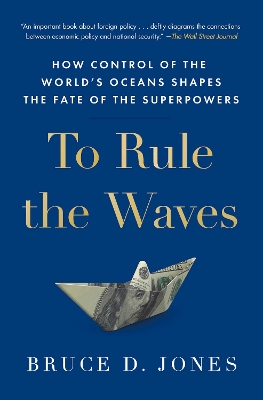
From a brilliant Brookings Institution expert, an “important” (The Wall Street Journal) and “penetrating historical and political study” (Nature) of the critical role that oceans play in the daily struggle for global power, in the bestselling tradition of Robert Kaplan’s The Revenge of Geography.
For centuries, oceans were the chessboard on which empires battled for supremacy. But in the nuclear age, air power and missile systems dominated our worries about security, and for the United States, the economy was largely driven by domestic production, with trucking and railways that crisscrossed the continent serving as the primary modes of commercial transit.
All that has changed, as nine-tenths of global commerce and the bulk of energy trade is today linked to sea-based flows. A brightly painted forty-foot steel shipping container loaded in Asia with twenty tons of goods may arrive literally anywhere else in the world; how that really happens and who actually profits from it show that the struggle for power on the seas is a critical issue today.
Now, in vivid, closely observed prose, Bruce Jones conducts us on a fascinating voyage through the great modern ports and naval bases—from the vast container ports of Hong Kong and Shanghai to the vital naval base of the American Seventh Fleet in Hawaii to the sophisticated security arrangements in the Port of New York. Along the way, the book illustrates how global commerce works, that we are amidst a global naval arms race, and why the oceans are so crucial to America’s standing going forward.
As Jones reveals, the three great geopolitical struggles of our time—for military power, for economic dominance, and over our changing climate—are playing out atop, within, and below the world’s oceans. The essential question, he shows, is this: who will rule the waves and set the terms of the world to come?
(Mostly) Solid Examination Of History And Current Events. This is a fairly well documented - nearly 100 pages of its 400 are bibliography, *in addition to* at least a few paragraphs of footnotes at the end of every chapter - examination of both the history and current events of why both commercial and military control of the oceans is so important to human advancement. Some of the facts presented are truly mind-boggling, such as the sheer size of the Maersk Madrid - a ship used as a recurring case study, where if its full load of possible shipping containers were transported in a standard 2-high rail configuration, the train just to load this singular ship would stretch for *78 miles*. Others are more "standard fare" for most anyone who knows anything about the history of ocean travel or oceanography. Still, the book is current through March 2021, which is remarkable considering that I acquired this ARC in early June 2021. A must-read on a wide variety of issues from the complexities of modern logistics to the root cause and practical implications of modern military struggles to even the loss of American manufacturing jobs and the rise of Donald Trump, this book shows how control of the oceans has impacted all of these topics and many, many more. Really the only more "YMMV" section is the emphasis on global warming/ global cooling / climate change/ whatever they're calling it these days alarmism in the final section, but even here there are enough actual facts to warrant close examination. Very much recommended.
Reading updates
-
Started reading
-
20 July, 2021:
Finished reading
-
20 July, 2021:
Reviewed
